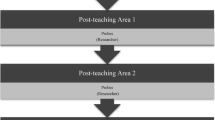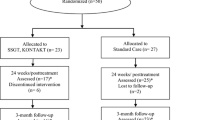Abstract
The purpose of this pilot study was to evaluate the efficacy of the interview skills curriculum (ISC), a manualized 12-week group-delivered intervention for young adults with autism spectrum disorder (ASD). This intervention aims to increase social–pragmatic skills essential to a successful job interview. Twenty-eight adults (18–36 years) were randomly assigned to one of two groups: ISC or waitlist control. Results revealed that the experimental group showed larger gains in social–pragmatic skills observed during a mock job interview than the control group. Treatment effects on distal outcomes, including social adaptive behaviors and depressive symptoms were not significant, although the respective effect sizes were medium/large. Results indicate that a brief, low-intensity treatment can improve the job-interview performance of young adults with ASD.

Similar content being viewed by others
References
American Psychiatric Association. (2000). Diagnostic and statistical manual of mental disorders (4th ed., Text Revision). Washington, DC: American Psychiatric Association.
Barnard, J., Harvey, V., Potter, D., & Prior, A. (2001). Ignored or ineligible? The reality for adults with autism spectrum disorders. London: National Autistic Society.
Carter, A. S., Messinger, D. S., Stone, W. L., Celimli, S., Nahmias, A. S., & Yoder, P. (2011). A randomized controlled trial of Hanen’s ‘More than Words’ in toddlers with early autism symptoms. Journal of Child Psychology and Psychiatry, 52(7), 741–752.
Centers for Autism and Related Disabilities. (2008). Adult Living Survey. Miami, FL (Unpublished survey).
Centers for Disease Control and Prevention. (2012). Prevalence of autism spectrum disorders—Autism and developmental disabilities monitoring network, 14 sites, United States, 2008. Surveillance Summaries, MMWR, 61(SS03), 1–19.
Chadsey-Rusch, J. (1992). Toward defining and measuring social skills in employment settings. American Journal of Mental Retardation, 96, 405–418.
Cohen, J. (1988). Statistical power analysis for the behavioral sciences (2nd ed.). Hillsdale, NJ: Erlbaum.
Committee, Interagency Autism Coordinating. (2012). Strategic plan for autism spectrum disorder research: 2012 update. Bethesda, MD: National Institutes of Health, Office of Autism Research Coordination.
Corcoran, R., Mercer, G., & Frith, C. D. (1995). Schizophrenia, symptomatology and social inference: Investigating “theory of mind” in people with schizophrenia. Schizophrenia Research, 17(1), 5–13.
Cotter, M. W. (1997). Improving the social behavior of high-functioning children with autism: A social skills support group intervention. Unpublished doctoral dissertation, University of Alabama.
Early Child Care Research Network, N.I.C.H.D., & Duncan, G. J. (2003). Modeling the impacts of child care quality on children’s preschool cognitive development. Child Development, 74, 1454–1475.
Fitzmaurice, G. M., Laird, N. M., & Ware, J. H. (2004). Applied longitudinal analysis. Hoboken, NJ: Wiley-Interscience.
Gantman, A., Kapp, S. K., Orenski, K., & Laugeson, E. A. (2012). Social skills training for young adults with high-functioning autism spectrum disorders: A randomized controlled pilot study. Journal of Autism and Developmental Disorders, 42, 1094–1103.
Gerhardt, P., & Lanier, I. (2011). Addressing the needs of adolescents and adults with autism: A crisis on the horizon. Journal of Contemporary Psychotherapy, 41, 37–45.
Hillier, A., Fish, T., Cloppert, P., & Beversdorf, D. Q. (2007). Outcomes of a social and vocational skills support group for adolescents and young adults on the autism spectrum. Focus on Autism and Other Developmental Disabilities, 22(2), 107–115.
Howlin, P. (2000). Outcome in adult life for more able indivdiuals with autism or Asperger syndrome. Autism, 4, 63–83.
Howlin, P., Goode, S., Hutton, J., & Rutter, M. (2004). Adult outcome for children with autism. Journal of Child Psychology and Psychiatry, 45(2), 212–229.
Howlin, P., Mawhood, L., & Rutter, M. (2000). Autism and developmental receptive language disorder—A follow-up comparison in early adult life. II: Social, behavioural, and psychiatric outcomes. Journal of Child Psychology and Psychiatry, 41, 561–578.
Howlin, P., & Yates, P. (1999). The potential effectiveness of social skills groups for adults with autism. Autism, 3(3), 299–307.
Jennes-Coussens, M., Magill-Evans, J., & Koning, C. (2006). The quality of life of young men with Asperger syndrome. Autism, 10(4), 403–414.
Klin, A., Saulnier, C. A., Sparrow, S. S., Cicchetti, D. V., Volkmar, F. R., & Lord, C. (2007). Social and communication abilities and disabilities in higher functioning individuals with autism spectrum disorders: The Vineland and the ADOS. Journal of Autism and Developmental Disorders, 37(4), 748–759.
Laugeson, E. A., & Frankel, F. (2010). Social skills for teenagers with developmental and autism spectrum disorders: The PEERS treatment manual. New York: Routledge.
Laugeson, E. A., Frankel, F., Gantman, A., Dillon, A. R., & Mogil, C. (2012). Evidence-based social skills training for adolescents with autism spectrum disorders: The UCLA PEERS program. Journal of Autism and Developmental Disorders, 42, 1025–1036.
Liptak, G. S., Kennedy, J. A., & Dosa, N. P. (2011). Social participation in a nationally representative sample of older youth and young adults with autism. Journal of Developmental and Behavioral Pediatrics, 32, 277–283.
Lord, C., Rutter, M., DiLavore, P., Risi, S., Gotham, K., & Bishop, S. (2012). Autism Diagnostic Observation Schedule-II. Los Angeles, CA: Western Psychological Services.
Lowe, B., Unutzer, J., Callahan, C. M., Perkins, A. J., & Kroenke, K. (2004). Monitoring depression treatment outcomes with the Patient Health Questionnaire-9. Medical Care, 42(12), 1194–2001.
Mawhood, L., & Howlin, P. (1999). The outcome of a supported employment scheme for high functioning adults with autism or Asperger syndrome. Autism, 3(229), 254.
McGovern, C., & Sigman, M. (2005). Continuity and change from early childhood to adolescence. Journal Child Psychology and Psychiatry, 46(4), 409–419.
Mesibov, G. (1985). Social skills training with verbal autistic adolescents and adults: A program model. Journal of Autism and Developmental Disorders, 14, 395–404.
Morgan, L. (2011). Social Pragmatic Scale. Unpublished manual, Florida State University, Tallahassee, FL.
Newton, J. H., McIntosh, D. E., Dixon, F., Williams, T., & Youman, E. (2008). Assessing giftedness in children: Comparing the accuracy of three shortened measures of intelligence to the Stanford-Binet Intelligence Scales, 5th edition. Psychology in the Schools, 5(6), 523–536.
Orsmond, G. I., Shattuck, P. T., Cooper, B. P., Sterzing, P. R., & Anderson, K. A. (2013). Social participation among young adults with an autism spectrum disorder. Journal of Autism and Developmental Disorders, 43, 2710–2719.
Ozonoff, S., & Miller, J. N. (1995). Teaching theory of mind: A new approach to social skills training for individuals with autism. Journal of Autism and Developmental Disorders, 25, 415–433.
Paul, R., Miles, S., Cicchetti, D., Sparrow, S., Klin, A., Volkmar, F., et al. (2004). Adaptive behavior in autism and pervasive developmental disorder-not otherwise specified: Microanalysis of scores on the Vineland Adaptive Behavior Scales. Journal of Autism and Developmental Disorders, 34, 223–228.
Perry, A., & Factor, D. C. (1989). Psychometric validity and clinical usefulness of the Vineland Adaptive Behavior Scales and the AAMD Adaptive Behavior Scale for an autistic sample. Journal of Autism and Developmental Disorders, 19(1), 41–55.
Provencal, S. L. (2003). The efficacy of a social skills training program for adolescents with autism spectrum disorders. Unpublished doctoral dissertation, University of Utah.
Renty, J., & Roeyers, H. (2006). Quality of life in high-functioning adults with autism spectrum disorder. Autism, 10(5), 511–524.
Resnick, B., Inguito, P., Orwig, D., Yahiro, J. Y., Hawkes, W., Werner, M., et al. (2005). Treatment fidelity in behavior change research: A case example. Nursing Research, 54(2), 139–143.
Roberts, D. L., Penn, D., & Combs, D. R. (2004). Social cognition and interaction training. Unpublished Treatment Manual.
Roid, G. H. (2003). Stanford-Binet Intelligence Scales (5th ed.). Itasca, IL: Riverside.
Roux, A. M., Shattuck, P. T., Cooper, B. P., Anderson, K. A., Wagner, M., & Narendof, S. A. (2013). Postsecondary employment experiences among young adults with an autism spectrum disorder. Journal of the American Academy of Child and Adolescent Psychiatry, 52(9), 931–939.
Shadish, W. R., Cook, T. D., & Campbell, D. T. (2002). Experimental and quasi-experimental designs for generalized causal inference. Boston: Houghton Mifflin.
Shtayermman, O. (2007). Peer victimization in adolescents and young adults diagnosed with Asperger’s syndrome: A link to depressive symptomatology, anxiety symptomatology, and suicidal ideation. Issues in Comprehensive Pediatric nursing, 30, 87–107.
Sigman, M., & McGovern, C. W. (2005). Improvement in cognitive and language skills from preschool to adolescence in autism. Journal of Autism and Developmental Disorders, 35(1), 15–23.
Sparrow, S., Balla, D., & Cicchetti, D. (2004). Vineland-II Adaptive Behavior Scales. Circle Pines, MN: American Guidance Service.
Spitzer, R., Kroenke, K., & Williams, J. (1999). Validation and utility of a self-report version of PRIME-MD: The PHQ primary care study. Journal of the American Medical Association, 282, 1737–1744.
Sterling, L., Dawson, G., Estes, A., & Greenson, J. (2008). Characteristics associated with the presence of depressive symptoms in adults with autism spectrum disorder. Journal of Autism and Developmental Disorders, 38(6), 1011–1018.
Szatmari, P., Bartolucci, G., & Bremner, R. (1989). Asperger’s syndrome and autism: Comparison of early history and outcome. Developmental Medicine and Child Neurology, 1(6), 709–720.
Taylor, J. L., & Seltzer, M. M. (2011). Employment and post-secondary educational activities for young adults with autism spectrum disorders during the transition to adulthood. Journal of Autism and Developmental Disorders, 41, 566–574.
Turner-Brown, L. M., Perry, T. D., Dichter, G. S., Bodfish, J. W., & Penn, D. L. (2008). Brief report: Feasibility of social cognition and interaction training for adults with high functioning autism. Journal of Autism and Developmental Disorders, 38, 1777–1784.
Venter, A., Lord, C., & Schopler, E. (1992). A follow-up study of high-functioning autistic children. Child Psychology and Psychiatry and Allied Disciplines, 33(3), 489–507.
Webb, B. J., Miller, S. P., Pierce, T. B., Strawser, S., & Jones, W. P. (2004). Effects of social skill instruction for high-functioning adolescents with autism spectrum disorders. Focus on Autism and Other Developmental Disabilities, 19, 53–62.
Whitehouse, A. J., Durkin, K., Jaquet, E., & Ziatas, K. (2009). Friendship, loneliness and depression in adolescents with Asperger’s syndrome. Journal of Adolescence, 32, 309–322.
Williams-White, S., Keonig, K., & Scahill, L. (2007). Social skills development in children with autism spectrum disorders: A review of intervention research. Journal of Autism and Developmental Disorders, 37, 1858–1868.
Acknowledgments
Preparation of this article was supported by a Pilot Treatment Grant (#7454, PI Lindee Morgan) from Autism Speaks. We are deeply grateful for the study participants and their families. We also wish to acknowledge the support and assistance of Holly Dickinson, Lauren Propst, Kim McShane, Kathy Watkins, Steve Barnes, Shirley Nicoll, Karen Robins, Marisa Laughrey, Sarah Richter, Joy Moore, Susan Baldino, Jazmin Caton, Michael Landing, Bryan Schultz, Patricia Armstrong, and Amy Wetherby.
Author information
Authors and Affiliations
Corresponding author
Rights and permissions
About this article
Cite this article
Morgan, L., Leatzow, A., Clark, S. et al. Interview Skills for Adults with Autism Spectrum Disorder: A Pilot Randomized Controlled Trial. J Autism Dev Disord 44, 2290–2300 (2014). https://doi.org/10.1007/s10803-014-2100-3
Published:
Issue Date:
DOI: https://doi.org/10.1007/s10803-014-2100-3




